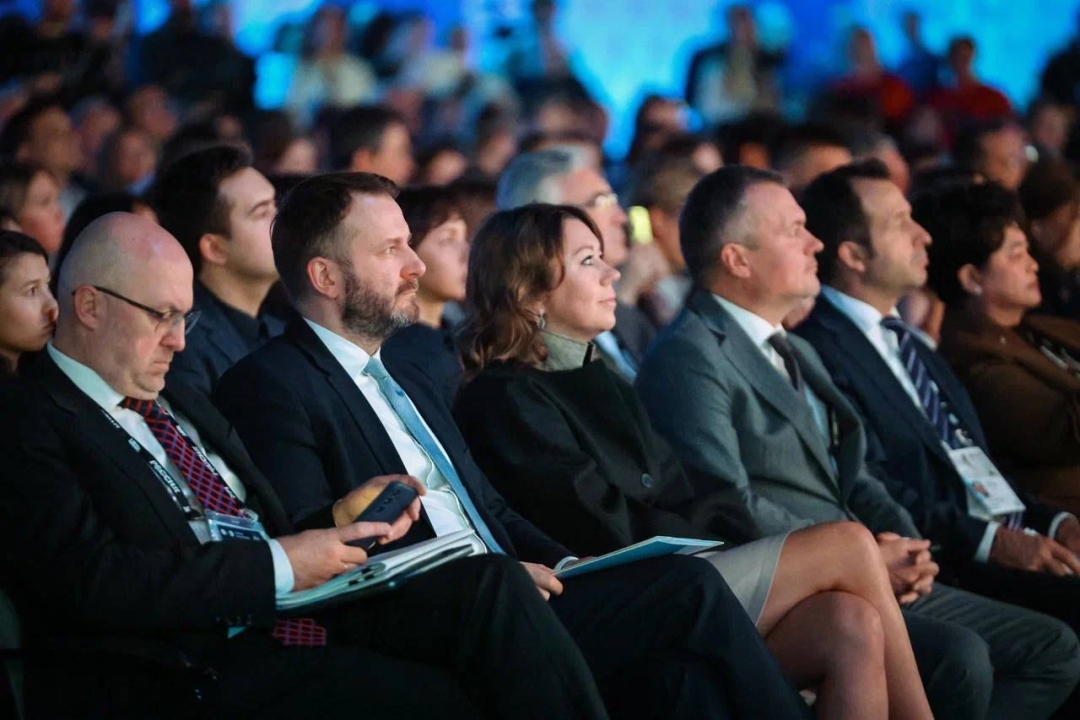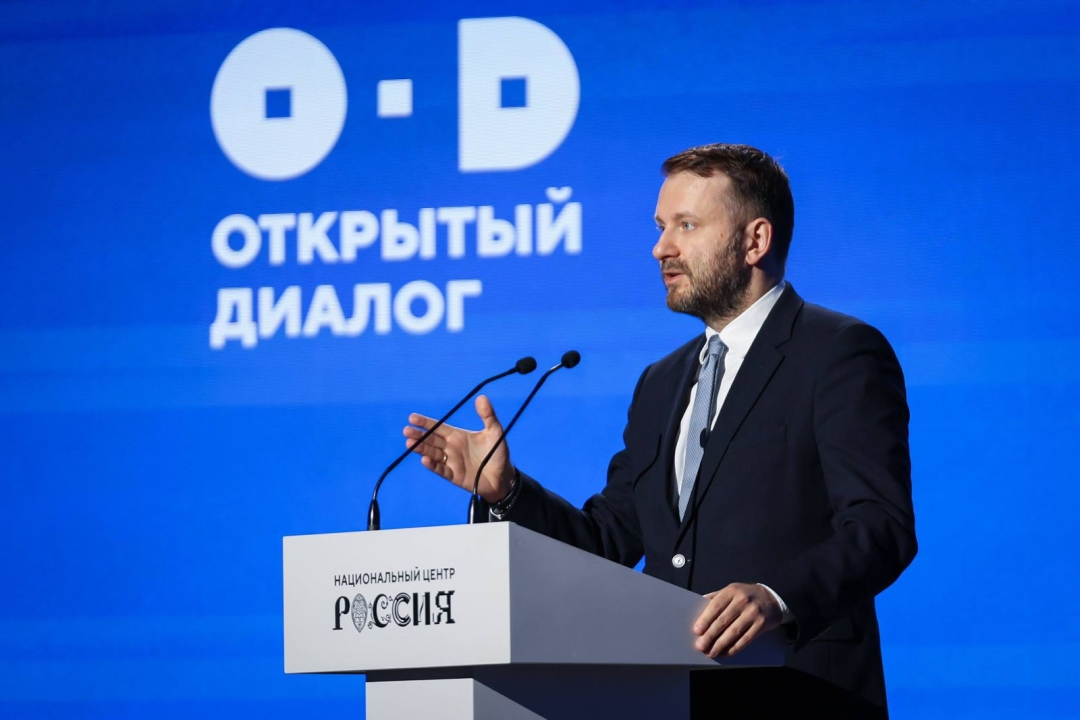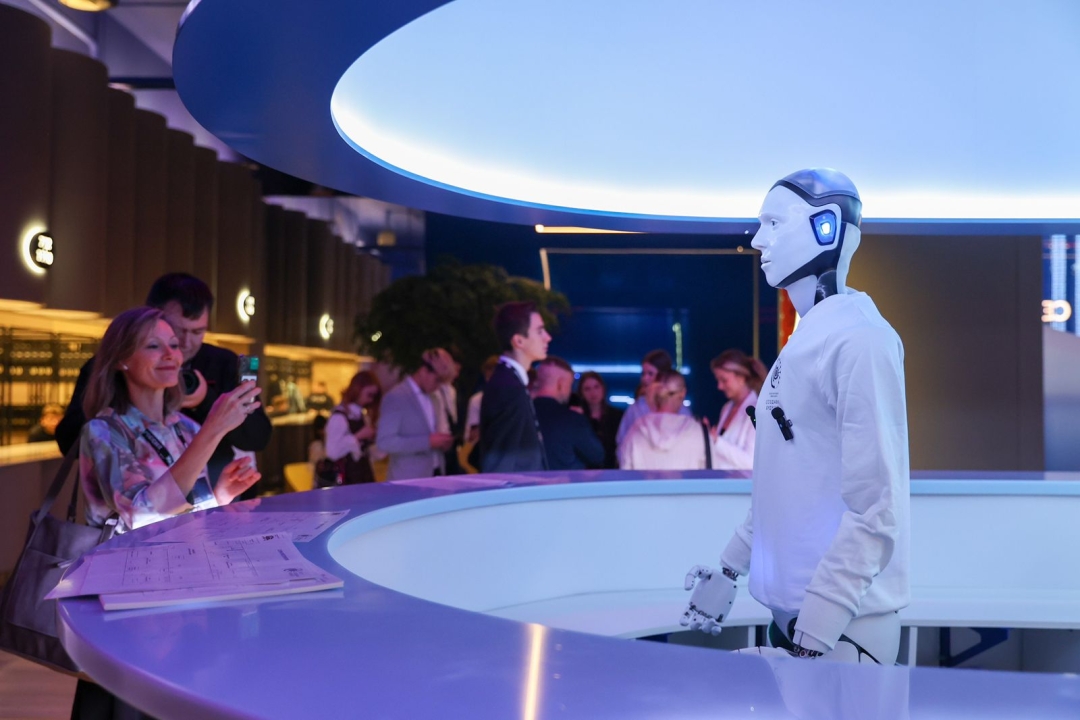The II International Symposium "Creating the Future" has concluded at the National Center "Russia." It brought together over 7,000 participants from 86 countries, including nations from the SCO, BRICS, Europe, USA, Latin America, Southeast Asia, and Africa. The online broadcast of events was watched by over 50.8 million people. Representatives from all constituent entities of the Russian Federation participated in the event. The main outcomes were the preparation of applied future development scenarios and their visualization. Recognizing its responsibility for the fate of the world, Russia initiated the development of scenarios stimulating global transformational shift. This is necessary for sustainable development across various spheres: economic, technological, environmental, and social.

At the opening ceremony, Deputy Chief of Staff of the Presidential Administration of the Russian Federation and Deputy Chairman of the National Center "Russia" Organizing Committee Maxim Oreshkin read a welcome message from Russian President Vladimir Putin to the Symposium participants. The head of state emphasized that the future must be created based on a sovereign worldview and tireless bold, innovative search, building on the achievements of ancestors and historical, spiritual, and patriotic traditions.
Maxim Oreshkin also announced that the Symposium has become part of the global "Open Dialogue" ecosystem. The importance of this decision was noted by National Center "Russia" General Director Natalia Virtuozova when summing up the event.
"The II International Symposium 'Creating the Future' has come to an end. This year, experts arrived from 86 countries: from North and South America, Europe, Asia, and Africa. Thank you very much for such attention. Our symposium is special. We gathered representatives of many creative professions—scientists, architects, artists. It's a pity that this grand event is ending. But there's also cause for joy: Deputy Chief of Staff of the Presidential Administration of Russia Maxim Stanislavovich Oreshkin announced that the Symposium will now become part of the global 'Open Dialogue' ecosystem," emphasized Natalia Virtuozova.

The program of the II International Symposium "Creating the Future" contained an expert component and, for the first time, an open educational program for all interested parties. The program included about 50 events: panel discussions, lectures, scenario workshop, strategic session, project laboratory, master classes, debates with audience voting, and much more.
The rich expert program included three tracks—"Society," "Technology," and "Global Cooperation." Among the key events was the scenario workshop "Scenarios of the Future: At the Intersection of Science and Creativity." Its participants—science fiction writers, futurologists, researchers, and representatives of creative industries—created a bank of ideas with future scenarios. Overall, the expert program resulted in about 100 forecasts and applied future development scenarios, some of which were accompanied by visualization.
The "Society" track was one of the most extensive. Experts discussed social forecasting and design, social models of the future, and trust as a key resource for social development. Based on the discussions, they formed a package of best practices in social design and selected optimal scenarios for societal development. Speaking at a session dedicated to social design, Head of the Presidential Administration Department for Monitoring and Analysis of Social Processes Alexander Kharichev spoke about creating the Institute of Social Architecture in Russia:
"The Institute of Social Architecture will resemble a design bureau that will create models based on forecasts and will take into account these technological changes in communication and in the social environment and social groups in general. They will also try to build social models of change and develop and implement projects," noted Alexander Kharichev.

Continuing the theme of cooperation between the state and public institutions, Presidential Assistant Andrey Fursenko spoke out.
"A very important goal is to establish normal interaction between science, business, the state, and necessarily with education. Without this interaction, progress is impossible," explained Andrey Fursenko. "A special role in supporting scientific and technological projects today is played by the Russian Science Foundation: it finances fundamental and applied research at the intersection of science and business. Such interaction and support are very important."
Track experts also discussed demographic challenges, human settlement issues, labor market development, art and media content of the future, and the formation of a new Russian visual style.
Within the "Technology" track, discussions covered the transfer of scientific developments to the real economy, artificial intelligence as a new "language of reality," and scenario planning in technologically significant industries. Physicists, mathematicians, and engineers made predictions about creating a new generation of sensors, biomedical devices, and computing devices on the threshold of the second quantum revolution. Scientists, doctors, bioengineers, and artificial intelligence developers assessed the prospects of future biotechnologies that are already rapidly changing medicine. Much was said about space exploration and the tasks Russia sets for itself in this field.
The "Global Cooperation" track addressed changes in international relations. Representatives of several industries developed plans for cooperation between Russia and the Global South in agriculture, nuclear energy, space, and creative industries. Experts also formulated a joint vision for partnership between Russia and African countries by 2063.
More than 260 specialists from various fields participated in the expert program: statesmen, business leaders, scientists and engineers, futurologists and forecasters, public figures, representatives of culture and media, and young professionals.
The open program audience included people of different ages and professions who care about the future of Russia and the world. The Open Lecture Series "Day of the Person of the Future" operated for two days. Its experts—visionaries, scientists, designers, and representatives of creative industries—suggested what changes await the world. For example, Radisson Collection Paradise Resort & Spa General Manager in Sochi Brian Gleeson presented prospects for hospitality industry development. In his opinion, hotels will actively use technologies to make service individual and convenient for each guest.
"In the hospitality industry of the future, the integration of artificial intelligence and technologies for service personalization will become key. Hotels will transition to contactless check-in using mobile applications, and room infrastructure management—lighting, climate, service orders—will be automated. Technologies will create unique experiences for each guest, considering individual preferences in food, health, and leisure. Growth in wellness tourism, educational programs, and modular budget hotels is expected. Traditional tourist destinations will remain, along with the opening of new regions for hotel business development," explained Brian Gleeson.
The symposium events generated great interest among foreign experts and guests. Chairman of the Chilean Robotics Association and expert in artificial intelligence, bioengineering, and cybersecurity Rodrigo Andres Quevedo Silva shared his impressions: "This is my second time participating in the International Symposium, and I see the high level of participants, speakers, and the topics discussed here. It seemed to me that Russia is already living in the future. While many countries are still in the past, Russia is in the future."
Russia's leadership in biotechnology was noted by co-founder and managing partner of 3D Bioprinting Solutions Yousef Hesuani: "In clinical application of 3D bioprinting, Russia has surpassed other countries, and this breakthrough happened in just 2.5 years. Russia has the most practical experience compared to other countries in the world—already more than 40 patients are living with transplanted bioprinted constructs."
On the sidelines of the Symposium, the Ministry of Science and Higher Education of Russia signed cooperation agreements with AST publishing house, ANO "National Priorities," and the charitable foundation "Contribution to the Future." The documents formalize cooperation within the framework of implementing the Decade of Science and Technology. Projects will be aimed at popularizing science fiction and developing education in artificial intelligence.
"The Decade of Science and Technology, announced by Russian President Vladimir Putin, is an unprecedented initiative that unites a large number of departments, companies, and various public organizations. The main task of the Decade is to attract talented youth to research and development. Today, Russian science is one of the youngest in the world. Almost every second scientist in the country is under 40 years old. This is a unique situation, because 20 years ago there were significantly fewer young people in this field," noted Deputy Minister of Science and Higher Education of the Russian Federation Denis Sekirinsky.
The Symposium featured the ceremonial presentation of the first All-Russian Literary Prize in Science Fiction. Winners were selected in four categories: "Literary Work," "Visual Image," "Translation," and "Publishing Project." The prize fund amounted to 4 million rubles.
Among the bright events of the Symposium was the "First Neurocontent Cup" by the presidential platform "Russia—Land of Opportunity" in support of specialists creating relevant content for government and commercial structures. Schoolchildren and students participated in the quiz "History of the Future: Science Fiction Technologies" as part of the All-Russian educational campaign for Arkady Strugatsky's 100th anniversary.
A heated atmosphere prevailed at public debates between techno-optimists and techno-pessimists, supporters of "protocol" and "creative" diplomacy. Young scientists in the "Case Study: Projects and Innovations Changing the World" event talked about creating their landmark projects and features of scientific work. Participants shared personal stories—not only about achievements but also about what usually remains behind the scenes: doubts, unexpected turns, and moments that forever changed their professional path. The open program also included lectures on various topics, the gastronomic show "Food of the Future," and much more.
Both days were crowded at the interactive robotics exhibition, where guests were greeted by a robot hostess, robot artist, and humanoid robot Ardy, with robot dogs and a robot cat performing tricks. Visitors could play drone basketball and drone football. In the gastronomic area, treats were available from a robot ice cream maker, robot barista, and robot waiters.
The International Symposium "Creating the Future" was organized by order of Russian President Vladimir Putin under the auspices of the Decade of Science and Technology with support from the Ministry of Foreign Affairs of the Russian Federation, the Ministry of Science and Higher Education of the Russian Federation, and the Ministry of Culture of the Russian Federation. Analytical partner—VCIOM Analytical Center. Literary partner—Eksmo-AST Publishing Group.
For reference: Dear colleagues, materials should use only two name variants: National Center "Russia" or NC "Russia." Please take this into account when preparing publications and official documents. The National Center "Russia" was created by order of President of the Russian Federation Vladimir Putin to preserve the legacy of the International Exhibition-Forum "Russia" and demonstrate the achievements of the country and its citizens on a permanent basis. Federal authorities, state companies, corporations, and regions participate in the center's work. The National Center "Russia" is located at: 14 Krasnopresnenskaya Embankment, Moscow. The Center is open from 10:00 to 20:00 every day except Monday.
Website — https://russia.ru/
https://t.me/gowithRussia
https://vk.com/gowithrussia
https://ok.ru/gowithrussia
https://dzen.ru/gowithrussia
Media Contact
Company Name: Russia National Centre
Contact Person: Media Relations
Email: Send Email
Country: Russian Federation
Website: https://russia.ru/



